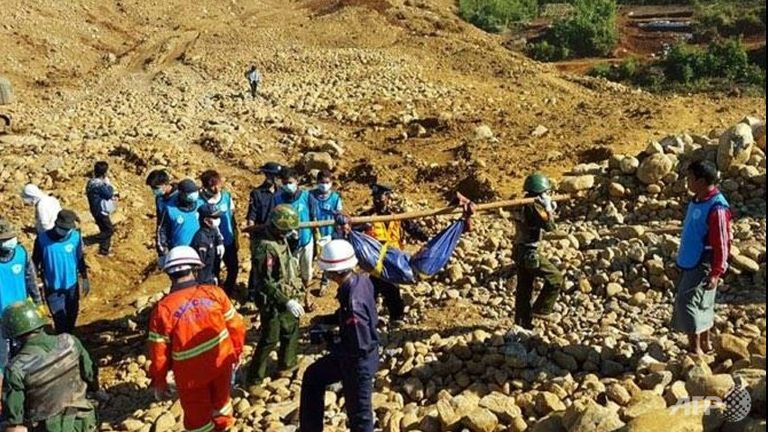Hopes fade for 100 miners missing after landslide near Myanmar jade mine
 |
| Soldiers carry the bodies of miners killed by a landslide in a jade mining area in Hpakhant, in Myanmar's Kachin state. (Photo: AFP) |
YANGON: Hopes faded on Monday that any of an estimated 100 people missing would be found alive after a landslide in northern Myanmar buried an encampment near a jade mine, and officials said it was still unclear how many people were living in the area.
Rescue workers had recovered 113 bodies when the search was suspended on Monday evening, Khin Kyaw, a local police officer, told Reuters. Two of the bodies recovered were women, he said.
Heavy equipment has been brought in to assist the digging in Hpakant, the site of the landslide in a mountainous area in the northern Kachin State that produces some of the world's highest-quality jade.
"We just don't know how many people exactly were buried since we don't have any data on people living there," Tin Swe Myint, head of the Hpakant Township Administration Department, said on Sunday.
"It was just a slum with these ... workers living in makeshift tents."
A man-made mountain of earth excavated from mines gave way in the early hours of Saturday, smashing into a makeshift settlement at the foot of the slag heap and burying mine workers as they slept.
The mines and soil dump sites are hazardous and deaths among the many migrant workers who pick through the slag piles for jade are common.
An official from the Myanmar Gems Enterprise, a division of the Ministry of Mines that oversees the mining and sales of jade and other gems, said that landslides at dump sites were "very common."
Ko Sai, a miner who was at a nearby camp, said the landslide hit around 3 a.m., when many miners were sleeping.
"We just heard a loud noise sounding like thunder and saw that the huge mountain collapsed and a huge wave of rubble was moving and sprawling on a wide area," Ko Sai said.
"It was just like a nightmare," he said.
Several companies had dumped mining debris at the 200-acre dump site, said Tin Swe Myint. The dump was near a mine controlled by the Triple One Jade Mining Company, he said.
Much of the jade that is mined in Hpakant is believed to be smuggled to neighbouring China, where the stone is highly valued.
DYSTOPIAN WASTELAND
The value of jade production in Myanmar is estimated to have been around US$31 billion in 2014, according to researchers from environmental advocacy group Global Witness, which published a report on the opaque sector earlier this year.
Just over a third of that value showed up in official Chinese trade data.
Jade mining companies controlled by Myanmar's powerful military, tycoons linked to them, and drug barons have made Hpakant a "dystopian wasteland", Global Witness said in a statement.
"There is no regulation, there is no engineering involved in this and there would need to be to keep these structures stable," said Global Witness' Asia Director Mike Davis, referring to the mining dumps.
Opposition leader Aung San Suu Kyi's National League for Democracy (NLD), which won a national election earlier this month, pledged in its manifesto to bring transparency to the mining industry and make it safe.
The NLD has made no official comment on the disaster.
| RELATED CONTENTS: | |
| At least 90 dead in Myanmar jade mine landslide: Officials | |
What the stars mean:
★ Poor ★ ★ Promising ★★★ Good ★★★★ Very good ★★★★★ Exceptional
Latest News
More News
- Foreign leaders extend congratulations to Party General Secretary To Lam (January 25, 2026 | 10:01)
- Russian President congratulates Vietnamese Party leader during phone talks (January 25, 2026 | 09:58)
- Worldwide congratulations underscore confidence in Vietnam’s 14th Party Congress (January 23, 2026 | 09:02)
- Political parties, organisations, int’l friends send congratulations to 14th National Party Congress (January 22, 2026 | 09:33)
- 14th National Party Congress: Japanese media highlight Vietnam’s growth targets (January 21, 2026 | 09:46)
- 14th National Party Congress: Driving force for Vietnam to continue renewal, innovation, breakthroughs (January 21, 2026 | 09:42)
- Vietnam remains spiritual support for progressive forces: Colombian party leader (January 21, 2026 | 08:00)
- Int'l media provides large coverage of 14th National Party Congress's first working day (January 20, 2026 | 09:09)
- Vietnamese firms win top honours at ASEAN Digital Awards (January 16, 2026 | 16:45)
- ASEAN Digital Ministers' Meeting opens in Hanoi (January 15, 2026 | 15:33)
















 Mobile Version
Mobile Version